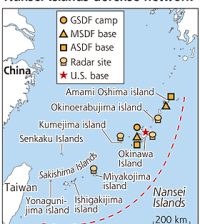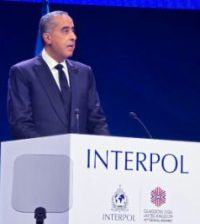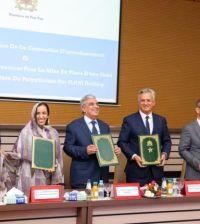- Washington “follows with interest” Morocco’s openness onto Africa (John Kerry)Posted 12 years ago
- The trial of South African Paralympic champion Oscar Pistorius opened in Pretoria on Monday.Posted 12 years ago
- USA welcomes efforts of King Mohammed VI in MaliPosted 12 years ago
- Egypt’s population reaches 94 millionPosted 12 years ago
- Mugabe celebrates his 90thPosted 12 years ago
- Moroccan Monarch to Build a Perinatal Clinic in BamakoPosted 12 years ago
- King Mohammed VI handed a donation of bovine semen for the benefit of Malian breeders.Posted 12 years ago
- Moroccan King’s strategic tour to Africa: Strengthening the will of pan African Solidarity and stimulating the south-south cooperation mechanisms over the continentPosted 13 years ago
- Senior al-Qaida leader killed in AlgeriaPosted 13 years ago
- Libya: The trial of former Prime Minister al-Baghdadi AliPosted 13 years ago
Trump’s Sudden Pivot to Sudan and the Return of Gulf Rivalries to the White House
President Donald Trump’s declaration that he will “put greater attention” on ending Sudan’s civil war marks the most direct engagement by his administration in the 20-month conflict. Yet the decision appears driven less by a structured U.S. policy review and more by Saudi Crown Prince Mohammed bin Salman’s (MBS) personal appeal during their high-profile meeting in Washington.
Trump openly acknowledged that the crisis “wasn’t on my charts” until MBS raised it—an admission that underscores how Sudan has remained off Washington’s strategic radar despite becoming the world’s worst humanitarian catastrophe, with more than 40,000 killed and 14 million displaced.
While the announcement gives Washington an opening to re-enter a crisis long shaped by regional powers, it also exposes the deep geopolitical fractures that underpin the Sudanese war and complicate any external mediation.
A Gulf-Driven Agenda Behind Trump’s Pivot
Saudi Arabia’s renewed pressure on Washington reflects growing anxiety in Riyadh over the trajectory of Sudan’s collapse.
Saudi officials reportedly warned Trump that the destruction of Sudan:
- threatens Red Sea maritime security,
- destabilizes Northeast Africa,
- and creates vacuums ripe for extremist exploitation.
For Riyadh—now seeking to project itself as a regional stabilizer—Sudan’s implosion represents both a strategic and reputational threat. MBS’s framing of Sudan as the “greatest thing” Trump could resolve was a calculated appeal to a president who has repeatedly emphasized his peacemaking ambitions and invoked the Nobel Prize in political messaging.
Trump’s decision also fits his pattern: foreign policy initiatives that emerge from personal relationships with Gulf leaders, rather than from institutional planning inside the State Department or National Security Council.
A Conflict Defined by Regional Power Competition
Sudan’s war cannot be separated from the shifting alliances of the Middle East. It is already the most regionally entangled African conflict since Libya’s collapse.
The split is stark:
- Backing the Sudanese Armed Forces (SAF): Egypt; Saudi Arabia; and Turkey
- Backing the Rapid Support Forces (RSF): United Arab Emirates (UAE) – accused by U.S. intelligence of sending weapons
The UAE-Saudi divergence is especially notable.
Although both are close U.S. partners, they back opposing sides in Sudan, mirroring earlier fractures in Libya (Haftar vs. Tripoli) and hinting at broader competition over African influence, ports, and gold resources.
By stepping in now, Trump risks entering a highly polarized regional arena, where Gulf rivalries are shaping battlefield outcomes faster than diplomacy.
Humanitarian Collapse Driving Urgency
The immediate trigger for renewed Western concern is the RSF’s capture of el-Fasher, the last major urban center in Darfur not under its control. The takeover:
- killed hundreds,
- displaced nearly 90,000 people overnight,
- and unleashed fresh atrocities documented by aid agencies and the U.N.
With roads cut, people fleeing across unsafe routes, and no access to food or medicine, aid organizations warn of a mass-casualty famine if the fighting continues.
Trump’s advisers—particularly Secretary of State Marco Rubio—now see the conflict not only as a humanitarian disaster but as a regional destabilizer with long-term implications for counterterrorism and Red Sea security.
Can Trump Deliver a Breakthrough?
Trump’s pledge to work with Saudi Arabia, the UAE, Egypt, and other Middle Eastern partners signals a pivot toward a Gulf-centered diplomatic model, rather than a Western-led one. Yet this approach faces obstacles:
- The Gulf powers themselves are divided, with Riyadh and Abu Dhabi backing opposing armed groups.
- The RSF’s battlefield momentum makes it less likely to accept cease-fire terms without guarantees of political dominance.
- The SAF’s international backers view concessions to the RSF as legitimizing a force accused of systematic atrocities.
- Sudan’s fragmented internal landscape—ethnic militias, local warlords, and economic networks—complicates any simple “deal”.
Trump’s admission that he had not studied the conflict until this week raises questions about how deeply the administration understands these dynamics.
Symbolism and Optics: MBS’s Washington Return
The moment is also symbolically significant.
This is MBS’s first visit to Washington in seven years, following strains over the war in Yemen, the Khashoggi killing, and disagreements over oil production.
By elevating Sudan during a joint appearance with Trump, the crown prince signaled:
his desire to reclaim diplomatic leadership in the region,
his interest in being seen as a stabilizer rather than a disruptor,
and his confidence in influencing U.S. decision-making.
Trump, who values personal rapport with Gulf leaders, appeared receptive.
A High-Stakes Test of Gulf Diplomacy and U.S. Engagement
Trump’s sudden pivot to Sudan could, in theory, inject fresh diplomatic momentum into ending a war that has shattered the country and destabilized an entire region.
But success will require navigating:
- deep Gulf rivalries,
- entrenched battlefield dynamics,
- a collapsing humanitarian landscape,
- and the absence of a unified international approach.
For now, Trump’s involvement marks a new chapter—but whether it becomes a decisive intervention or another symbolic gesture will depend on how the U.S. manages the conflicting agendas of its closest Middle Eastern partners.




